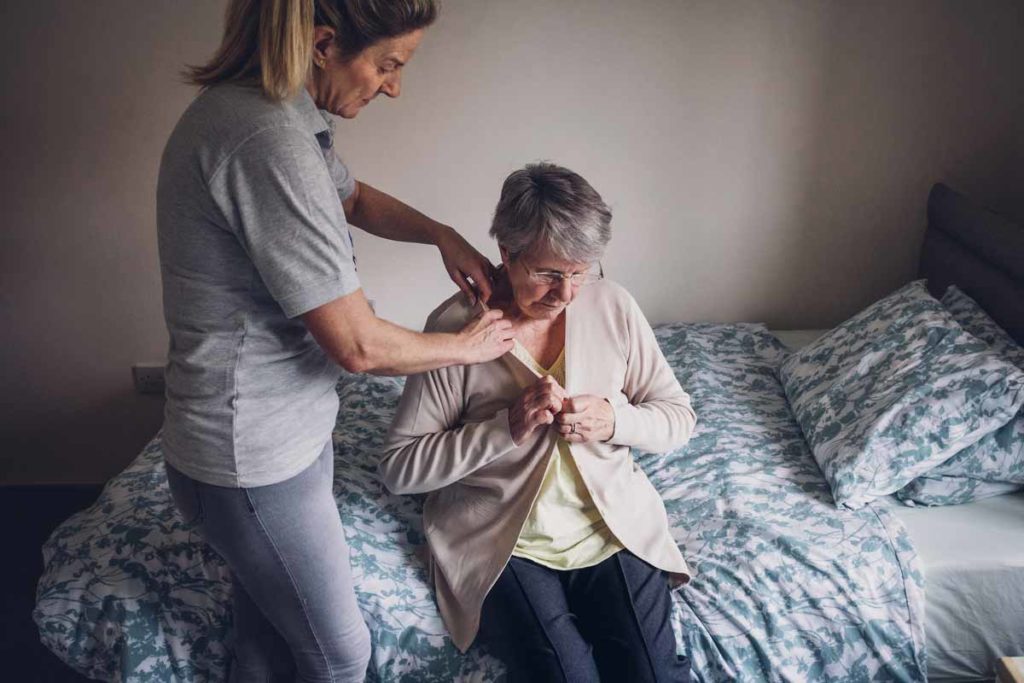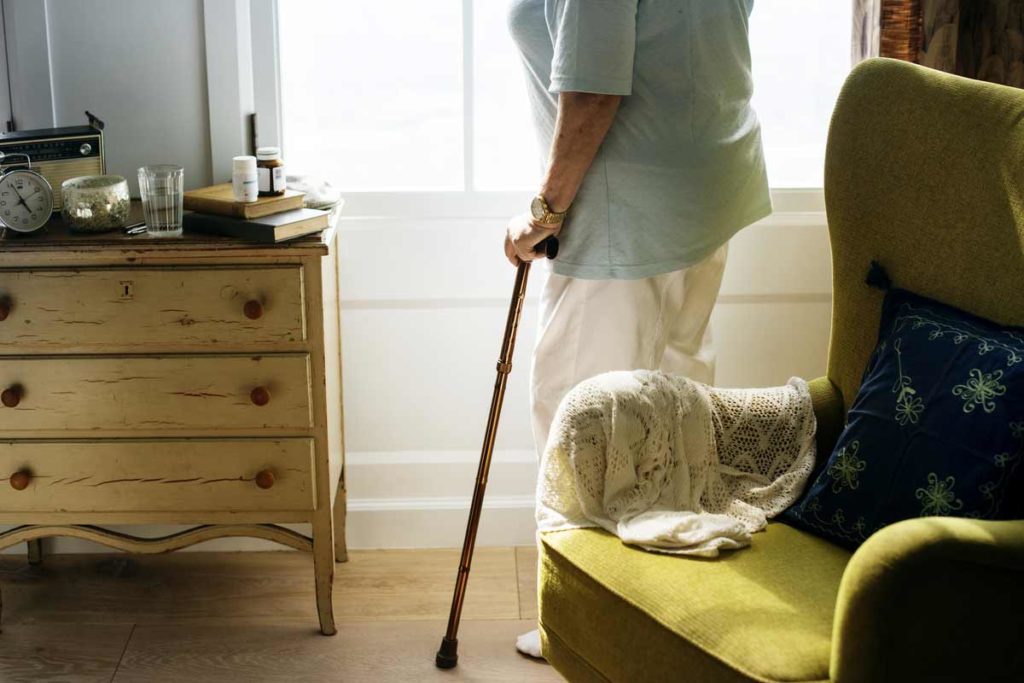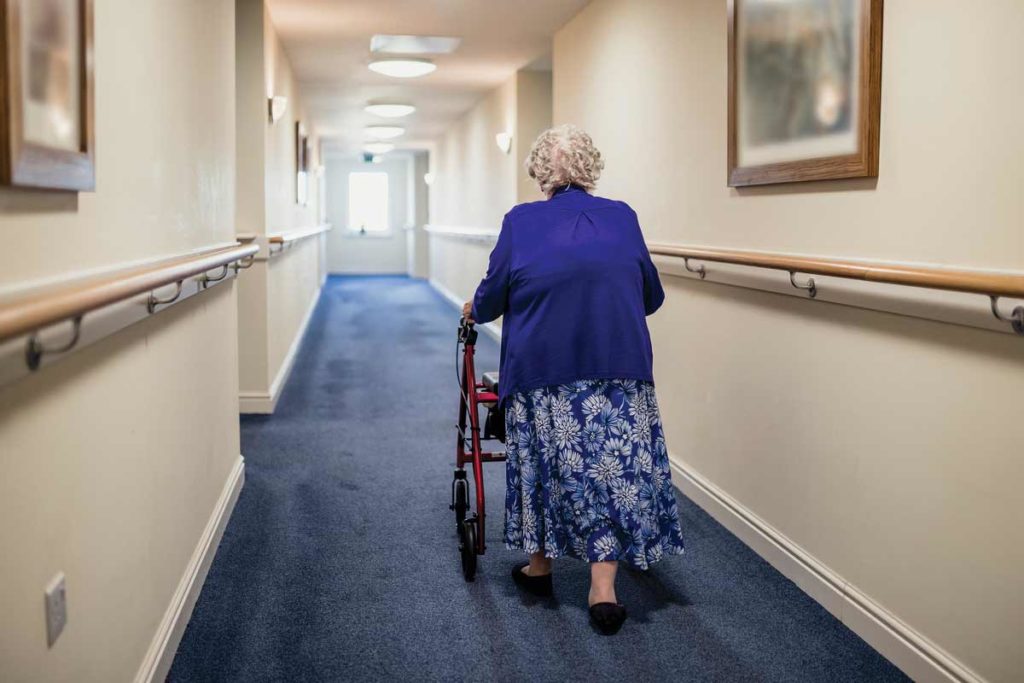Dementia care is all about constant adjustments. New challenges crop up, meaning that a caregiver must be constantly observant to behavioral changes. You may need to persuade your loved one to bathe. He or she becomes very obsessive about safety, constantly checking doors and windows, and wanting to take out the garbage, only to go outside and forget where the house is.
Facts:
- Six in 10 people with dementia will wander off.
- The average span of Alzheimer’s disease is seven years and it can go on as long as 20 years, with increasingly challenging care issues.
- 16.1 million Americans provide unpaid care for someone with Alzheimer’s or other dementias. The strain of the task has been shown in many studies to increase the risk of a variety of illnesses and even death.
- In 2017, these caregivers provided an estimated 18.4 billion hours of care, which is valued at over $232 billion.
- The total estimated worldwide cost of dementia is $818 billion in 2015, which represents 1.09% of global GDP. By 2018, the global cost of dementia will rise above a trillion in USD.
- In 2014, Alzheimer’s made up 29.9% of adult day service participants, 39.6% of residential care community residents, and 44.7% of hospice patients.
Caregivers and the Three Stages of Dementia

After dementia is diagnosed, it usually follows a three-stage, downward trajectory. In mild dementia, people may have difficulty internalizing new information, remembering names, and planning and managing complicated tasks. They may also be experiencing sadness, anxiety, loss of interest in things they once loved, and other symptoms of major depression.
Issues with personal hygiene, inappropriate language, and judgment crop up.
Patients with moderate dementia show changes in sensory processing and physical function. Issues with personal hygiene, inappropriate language, and judgment crop up. They can be completely energized at nighttime, when caregivers and other family members need to sleep. This is the point to call in a palliative care team for support. It also calls for some home modifications: removing throw rugs, installing locks and safety latches, and providing a toilet or bedpan in the bedroom.
Severe dementia leads to limited or no mobility, incontinence issues, extensive memory loss, and problems swallowing. The patient may have difficulty recognizing loved ones and could require around-the-clock care.
Coping with Dementia at Home

It isn’t easy to cope with dementia – for the patient or family members. But finding ways to enjoy life is still possible. Sometimes returning to an old activity can be stimulating and fun. Everyone will realize that patience is important when it comes to caring for a loved one with dementia, and a sense of humor helps a caregiver stay afloat. Watching amusing TV programs or sharing other laughter-inducing moments with the loved one goes a long way in reducing tension.
Home sensors, personal navigational devices and communications can help family members monitor and stay connected to a loved one with dementia. Apps and other technology can help him or her maintain contact with family and friends.
Occupational therapists have found activities that both dementia patients and caregivers can do together, tailored to each patient’s ability, needs and interests. This can keep a loved one calmer and more occupied.
As the loved one’s condition progresses, it becomes more and more important to know when to ask for – and accept – help. A care team calendar is a personalized online tool to coordinate caregiving duties between family and friends. This also enables everyone to share activities and information. Family members who live far away can help manage finances, arrange appointments, and help relieve a primary caregiver with visits.
Adult Day Services

If you are a full-time caregiver, adult day centers offer benefits to both you and the patient you love, while also giving you an emotional safety valve. Day care helps working family members balance job responsibilities with caregiving obligations. Other caregivers can use the time to finish tasks, do housework that may be easier with the patient away from home, run errands, or simply rest. Hours of service vary at each adult day care center, but some are open from seven to 10 hours a day. Some also may offer weekend and evening hours, and transportation and meals are often provided.
After several weeks, you may likely find that he or she looks forward to the routine of meeting people and joining in activities.
Adult day care centers give individuals with dementia a chance to socialize and engage in activities like exercise and music. Be prepared for some pushback at first: your patient needs time to adjust to the new experience and may resist going at first. But after several weeks, you may likely find that he or she looks forward to the routine of meeting people and joining in activities.
Day services vary depending upon the center. They range from counseling, health services, nutrition, recreation, behavior management, and personal care activities like eating and hair care. Some centers offer occupational, physical, or speech therapy. Find out if a center you are considering is prepared to deal with behaviors associated with dementia. These many include wandering, hallucinations, sexually inappropriate behavior, speech problems, or incontinence.
Many centers offer services on sliding scales, where caregivers pay according to ability or income. Medicaid covers adult day care costs in some states for low-income individuals. Be sure that you understand a center’s basic fees, financial assistance options, and additional charges for such services like crafts or field trips.
In-Home Care

In-home care brings a wide range of services provided in the home as opposed to a hospital or care facility. It can allow many dementia patients to age in place and help their caregivers in many ways. Some in-home services provide non-medical help, such as assistance with daily living. Other in-home services involve medical care given by a licensed health professional, such as a nurse or physical therapist.
Companion services offer supervision and help with recreational activities. Personal care services involve help with daily care activities like bathing, dressing, toileting, eating, exercising or other personal care. Homemaker services are an option for housekeeping, shopping or meal preparation. Skilled care help from a licensed health professional can assist with injections, physical therapy, and wound care. Sometimes home health care agencies coordinate skill cared services upon a doctor’s order.
To find the right in-home care services for your family, consult your primary care physician or local Alzheimer’s Association chapter for recommendations. You’ll want a provider who is experienced in dementia care.
Fees for home care services vary depending on many factors, including the cost of living in your area and the services involved. Medicare pays for certain in-home health care services when the patient is homebound and in need of skilled care. For this coverage, services must be considered reasonable and necessary.
Respite Care

To be effective for your loved one, it is vital that you take care of your own health. Not only does caring for a dementia patient bring stress in and of itself, but you could be dealing with anticipatory grief knowing the loss that is yet to come. Talking to a counselor or social worker can help understand these feelings and develop strategies for dealing with them.
Residential facilities may offer the option for a stay overnight, for a few days or a few weeks.
In the meantime, schedule overnight stays at a memory-care facility so you can get some relief. Do everything you can to avoid caregiver burnout or health issues of your own. If you aren’t ready for another level of care, make sure that someone else is close by.
Respite care is one situation for which you should plan ahead. You may have an emergency or an important trip that would require being away from the person for whom you are caring. That means looking into respite providers and talking with family, friends and neighbors you trust with helping out in an emergency.
Try a provider or alternative caregiver out in a non-emergency situation, so you’re ready if the need arises. It’s a good idea to have contact information for the dementia patient’s medical team as well as a list of all current medications (with dosage and frequency taken) easily accessible at all times.
Respite services come in many forms. In-home care services range from companion services to home health aides. Skilled care services help dementia patients with medication and other medical issues. Adult day centers, which often provide meals and transportation, offer a place where the person with Alzheimer’s can be with others in a safe environment while staff members lead planned activities. Residential facilities may offer the option for a stay overnight, for a few days or a few weeks.
The cost for in-house respite services varies and is usually not covered by insurance or Medicare. However, many private foundations have been set up to provide respite care and help caregivers who need a break.
When Living At Home is No Longer an Option

There may come a point when your family member will need more hands-on care than you can personally give him or her. After the early stages of Alzheimer’s, for example, 24-hour supervision will be a must. As the disease moves into later stages, those needs include round-the-clock care. The home can also become unsafe for the patient.
You may feel conflicted and question even the most carefully thought-out decision.
If you work, you could find yourself neglecting your job responsibilities. You could compromise your relationship with your spouse or not be fully present for your children. If you are becoming irritable and impatient, you are neither helping your loved one nor yourself.
Even if you anticipated this transition, following through with it can cause stress and anguish. You may feel conflicted and question even the most carefully thought-out decision. It’s normal to worry about whether you are doing right by him or her. Fortunately, many families find that a care facility’s structure and social offerings benefit their loved ones.
The cost for care varies widely depending on the type of facility. Basic services in an assisted living facility average out at $45,000 annually. The average yearly cost for a private room in a nursing home is $97,455 per year, with a semi-private room in a nursing home at $85,775
While long-term care insurance, veterans’ benefits, and Medicaid may cover residential care, this is generally an out-of-pocket expense. Be aware that Medicare only covers short-term skilled care following hospitalization, and it does not cover the cost of long-term care in a care facility.
Residential Care

Sometimes someone with dementia benefits from living in a communal environment. Different types of facilities provide different levels of care, depending on the person’s needs.
Retirement Housing
may work successfully in early-stage Alzheimer’s cases. Sometimes these patients can live alone and practice self-care but cannot easily manage an entire house. This type of housing allows for independence and on-site social activities and transportation. Assisted living offers a combination of housing, meals, healthcare, and support with daily living activities. Since not all assisted living facilities offer services designed for residents with dementia, be sure to ask and consider all your local options. Nursing homes provide round-the-clock care and long-term medical treatment, which dementia-affected residents will eventually need. Most nursing facilities have services and staff to address issues like recreation, nutrition, and care planning. Different nursing homes have different staff-to-resident ratios. Be aware that some may have more experience or training with dementia than the staff at another. Nursing homes are usually licensed by the state and regulated by the federal government.
Nursing homes provide round-the-clock care and long-term medical treatment, which dementia-affected residents will eventually need.
Special Care Units (SCUs)
meet the specific needs of individuals with Alzheimer’s and other dementias. Also known as memory care units, SCUs are found in various types of residential facilities. Such units most often cluster settings in which persons with dementia are grouped on a floor or a unit within a larger residential care facility, and sometimes they are locked or secure. Some states require long-term care facilities to disclose their fees and list the specialized services their SCU provides. This required disclosure often includes specialized activities and ability of staff to care for residents with behavioral issues. Regardless of the laws in your area, be sure to ask specific questions about what type of care a SCU provides to be sure it will work for your family member.
Continuing Care Retirement Communities (CCRCs)
offer a range of care levels based on a resident’s needs. A resident is able to move throughout the different levels of care within the community if his or her needs change. Payment may consist of monthly fees, or a CCRC may collect an initial entry fee with subsequent monthly charges.
Hospice Care

Rather than focusing on curing a chronic illness, hospice focuses on comfort and dignity at the end of life. It involves care and support services that can be of great benefit to patients and caregivers affected by Alzheimer’s and other dementias.
Hospice is not a physical place, but rather a special way of caring for terminally ill patients and their families. Its primary purpose is to manage pain and other symptoms during the last six months of life where treatments focus on comfort rather than curing the underlying disease. Most hospice care takes place at home or in a nursing facility. There are also some free-standing hospice facilities and hospice units within hospitals.
Hospice care involves an “interdisciplinary team” of specially trained providers, including doctors, nurses, social workers, home health aides, counselors, clergy, and volunteers. The team not only provides medical care and pain relief, but counseling, respite care, and bereavement support.
To qualify for hospice care, a physician and hospice medical director must certify that the individual’s life expectancy is six months or less. If you believe your family member is in need of hospice services, communicate this to the physician who is currently providing care. If Medicare is the insurance provider – which is usually the case –Medicare Part A is necessary to qualify. The patient or an appointed person with durable power of attorney formally elects to receive hospice care and waives the right for Medicare to pay for any other services to treat the terminal illness. Once this is done, Medicare will continue to pay for any services not related to the terminal illness. In some cases where a person does not have coverage, community donations make services possible.
Before hospice care commences, the interdisciplinary team meets with the family and referring physician to create an individualized care plan. Once care does begin, the family has 24-hour on-call access to hospice staff. You can discontinue it or opt back in as long as you continue to qualify.
For a hospice appropriate for dementia needs, your local Alzheimer’s Association chapter can provide referrals in your area.
Patients can usually use hospice services as long as they need them. If they live longer than six months past enrollment, services are usually still covered by Medicare, Medicaid and many private insurers as long as a doctor recertifies that the person is terminally ill and still meets hospice care requirements.
When you are looking at hospice providers, first be sure that it is Medicare-certified if that is your payment method. Your provider should have a 24-7 call line. An agency with a history in the community is desirable, as are specialized services to keep patients comfortable.
Find out whether workers have provided hospice care to other patients with Alzheimer’s or dementia. For a hospice appropriate for dementia needs, your local Alzheimer’s Association chapter can provide referrals in your area.
Dementia care comes with its own set of care challenges. But understanding your care options and discussing them with family early in the condition’s stages lessens the burden for everyone.
Do you want to cite this page? Use our ready-made cite template.
